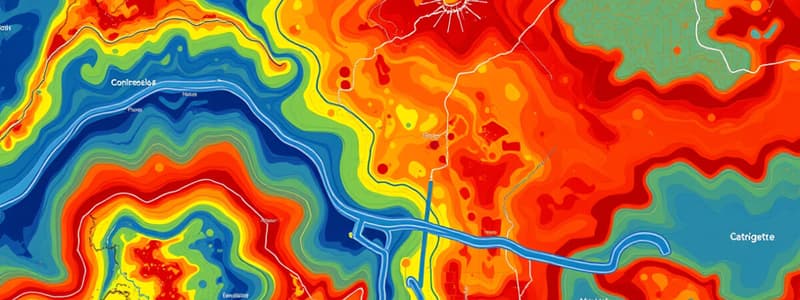Podcast
Questions and Answers
Which element is NOT considered a direct factor in the study of climate?
Which element is NOT considered a direct factor in the study of climate?
- Humidity
- Precipitation
- Temperature
- Urbanization (correct)
Which of the following climate zones is characterized by extremely low precipitation levels?
Which of the following climate zones is characterized by extremely low precipitation levels?
- Temperate
- Arid (correct)
- Tropical
- Polar
What is the primary function of Geographical Information Systems (GIS)?
What is the primary function of Geographical Information Systems (GIS)?
- To analyze and manage spatial or geographic data (correct)
- To predict climate change impacts on ecosystems
- To measure geological processes like erosion
- To study the effects of urbanization on human health
Which process is NOT a focus area in the study of physical geography?
Which process is NOT a focus area in the study of physical geography?
What aspect of climate change is primarily caused by the increase in greenhouse gases?
What aspect of climate change is primarily caused by the increase in greenhouse gases?
Which challenge is primarily associated with urban geography?
Which challenge is primarily associated with urban geography?
Which of the following is NOT a component of Geographical Information Systems (GIS)?
Which of the following is NOT a component of Geographical Information Systems (GIS)?
In which area of human geography is urban morphology primarily studied?
In which area of human geography is urban morphology primarily studied?
Which of the following is a key topic in physical geography?
Which of the following is a key topic in physical geography?
Flashcards are hidden until you start studying
Study Notes
Climatology
- Definition: Study of climate, weather patterns, and their effects on the environment and human activities.
- Elements of Climate:
- Temperature
- Humidity
- Precipitation
- Wind
- Climate Zones:
- Tropical
- Arid
- Temperate
- Polar
- Climate Change:
- Global warming
- Greenhouse gases
- Impact on ecosystems and human populations
Urban Geography
- Definition: Study of urban spaces, their development, and the interactions within urban areas.
- Key Concepts:
- Urbanization: Movement of populations from rural to urban areas.
- Urban Morphology: Structure and layout of urban areas.
- Land Use: Distribution of different activities (residential, commercial, industrial).
- Challenges:
- Overpopulation
- Transportation issues
- Environmental sustainability
Geographical Information Systems (GIS)
- Definition: Systems designed to capture, store, analyze, and manage spatial or geographic data.
- Components:
- Hardware: Computers and GPS devices
- Software: GIS applications (e.g., ArcGIS)
- Data: Spatial data (maps) and attribute data (information about features)
- Applications:
- Urban planning
- Environmental management
- Disaster response and management
Physical Geography
- Definition: Study of natural features and processes of the Earth’s surface.
- Key Topics:
- Landforms: Mountains, valleys, plains, plateaus
- Biogeography: Distribution of ecosystems and species
- Soils: Types, formation, and importance
- Hydrology: Water bodies, their distribution, and movement
- Processes:
- Erosion and weathering
- Plate tectonics
- Climate systems
Human Geography
- Definition: Study of human activities, cultures, and their relationship with the environment.
- Key Areas:
- Population geography: Demographics, migration patterns, population growth
- Cultural geography: Traditions, languages, religions
- Economic geography: Trade, industry, resource distribution
- Focus:
- Human-environment interactions
- Spatial analysis of human behavior
- Globalization and its impacts on societies and cultures
Climatology
- Study of climate and weather patterns, analyzing their effects on the environment and human activities
- Key elements include temperature, humidity, precipitation, and wind
- Distinct climate zones are categorized as tropical, arid, temperate, and polar
- Climate change is characterized by global warming, the increase of greenhouse gases, and significant impacts on ecosystems and human populations
Urban Geography
- Focuses on urban spaces, their development, and interactions within cities
- Urbanization refers to the shift of populations from rural to urban locales, leading to demographic changes
- Urban morphology examines the structural layout of cities, influencing transportation and land use patterns across residential, commercial, and industrial areas
- Major challenges include overpopulation, insufficient transportation systems, and the need for environmental sustainability
Geographical Information Systems (GIS)
- GIS encompasses systems that capture, store, analyze, and manage spatial or geographic data
- Components consist of hardware like computers and GPS devices, software such as GIS applications (e.g., ArcGIS), and varied data types (spatial and attribute)
- Applications span urban planning, environmental management, and disaster response and recovery
Physical Geography
- Examines natural features and processes shaping the Earth's surface
- Key topics include landforms like mountains and valleys, biogeography focusing on ecosystem distribution, soil types and formation, and hydrology regarding water bodies
- Processes of interest include erosion and weathering, plate tectonics that shape landforms, and the systems of climate affecting weather
Human Geography
- Investigates human activities, cultures, and their relationship with the environment
- Focus areas include population geography (demographics, migration, and growth), cultural geography (traditions, languages, religions), and economic geography (trade, industries, resource distribution)
- Emphasizes human-environment interactions, spatial analysis of behavior, and the impacts of globalization on societies and cultures
Studying That Suits You
Use AI to generate personalized quizzes and flashcards to suit your learning preferences.




